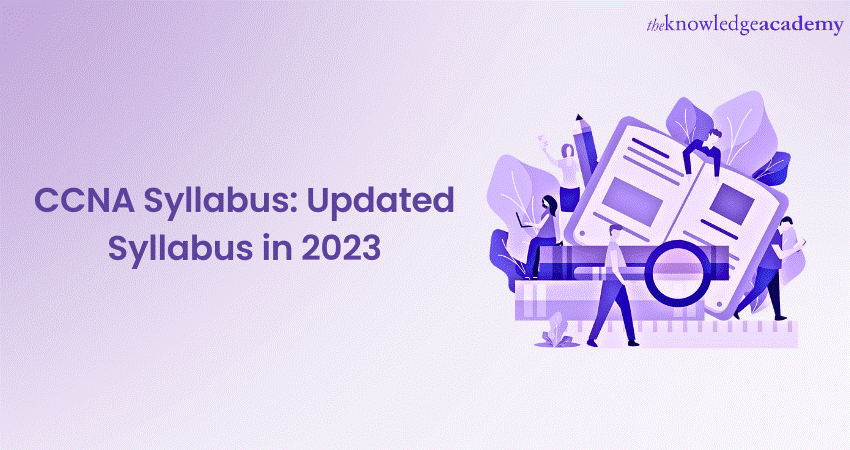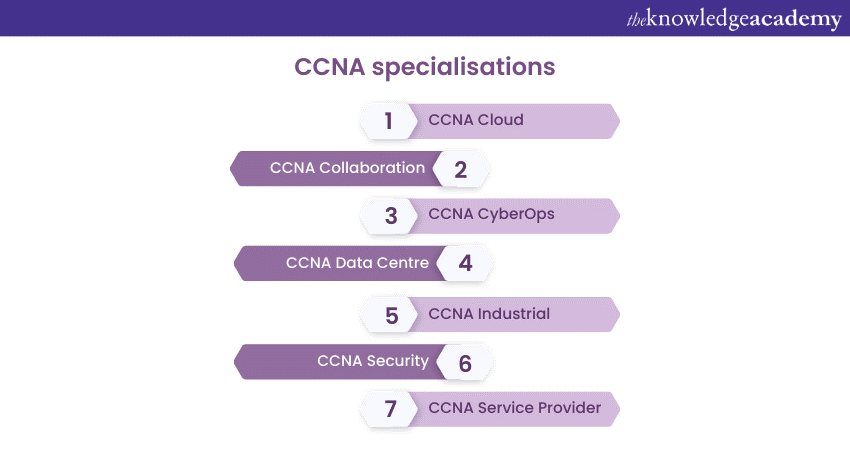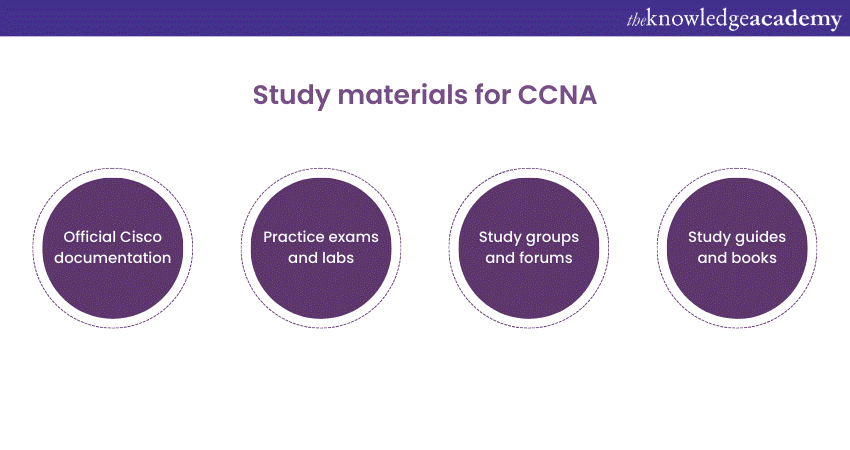We may not have the course you’re looking for. If you enquire or give us a call on 01344203999 and speak to our training experts, we may still be able to help with your training requirements.
We ensure quality, budget-alignment, and timely delivery by our expert instructors.

Cisco Certified Network Associate (CCNA) is a highly valued certification in the networking industry. Staying up-to-date with the CCNA Syllabus is of paramount importance for networking professionals. It validates your expertise and proficiency and ensures that you remain relevant and competitive in a rapidly changing industry.
Cisco-certified professionals are in high demand for high-paying job roles like Network Administrator and Systems Engineer. According to Glassdoor, the average annual salary of a Systems Engineer in the UK is £43,705. In this blog, you will learn about the CCNA Syllabus, its subjects, specialisations, and more.
Table of Contents
1) Significance of CCNA certification
2) CCNA curriculum – Explained
a) CCNA specialisations
b) Study materials for CCNA exam
c) Preparation tips for CCNA exam
3) Conclusion
Significance of CCNA certification
CCNA is an entry-level certification offered by Cisco Systems - a global leader in networking technologies. By obtaining the CCNA certification, you gain a comprehensive understanding of networking principles, protocols, and technologies.
You learn how to design, implement, and troubleshoot network infrastructures, ensuring smooth data transmission and efficient communication within organisations. This knowledge is highly sought in industries such as telecommunications, IT services, healthcare, finance, etc.
The benefits of earning the CCNA certification extend beyond personal and professional growth. Certified individuals often enjoy higher earning potential, as the certification validates their expertise and makes them more desirable to employers.
It offers a strong foundation for pursuing advanced Cisco certifications, such as Cisco Certified Network Professional (CCNP) or Cisco Certified Internetwork Expert (CCIE), further enhancing your career progression opportunities.
Take your networking career to new heights with our comprehensive CCNA Training Courses now!
CCNA Syllabus – Explained
The updated CCNA Syllabus or curriculum for 2025, covers a range of topics that are essential for networking professionals. The syllabus including CCNA 200 301 syllabus emphasises practical skills, configuration, and troubleshooting techniques, allowing candidates to develop hands-on expertise in implementing and managing network infrastructures. Here is a detailed breakdown of the key areas included in the syllabus:
|
Key topics |
Topic details |
|
Network fundamentals |
This section of CCNA focuses on providing a strong foundation in networking concepts, including the OSI and TCP/IP models, network topologies, protocols (such as Ethernet, IPv4, and IPv6), and basic network troubleshooting techniques. |
|
Network access |
a) The network access section of CCNA delves into topics related to LAN switching, Virtual Local Area Networks (VLANs), ethernet technologies, and wireless LANs. b) You'll learn about switch configuration, VLAN segmentation, spanning tree protocols, wireless standards, and basic wireless security. |
|
IP connectivity |
a) IP connectivity in CCNA covers essential topics such as IP addressing, subnetting, routing protocols (including OSPF and EIGRP), and inter-VLAN routing. b) This section of CCNA emphasises the configuration and troubleshooting of routers to establish reliable IP connectivity within networks. |
|
IP services |
a) In this section of CCNA, you'll explore important IP services, including Network Address Translation (NAT), Dynamic Host Configuration Protocol (DHCP), and network device security. b) You'll learn to configure and troubleshoot these services, ensuring efficient network operation and security. |
|
Security fundamentals |
a) The security fundamentals section of CCNA introduces network security concepts, common threats, and mitigation techniques. b) Topics covered in this section of CCNA may include access control, firewalls, secure network management, Virtual Private Network (VPN) technologies, and threat detection and prevention. |
|
Automation and programmability |
a) This section of CCNA covers the basics of network automation, programmable network architectures (such as SDN), and Application Programming Interfaces (APIs) to manage network devices. b) You'll learn about network automation tools, network programmability concepts, and how to utilise APIs for network management tasks. |
CCNA specialisations

Cisco provides a wide range of specialisations for networking professionals to enhance their skills and knowledge in specific areas of networking. They allow professionals to deepen their expertise and differentiate themselves in the industry. Here are some of the popular specialisations offered by Cisco:
1) CCNA Cloud: The CCNA Cloud specialisation focuses on cloud computing technologies and services. It covers topics such as cloud infrastructure, cloud deployment models (public, private, and hybrid), cloud storage, network virtualisation, and cloud security.
2) CCNA Collaboration: The CCNA Collaboration specialisation concentrates on unified communications and collaboration technologies. It covers IP telephony, video conferencing, Cisco Unified Communications Manager (CUCM), Cisco Unity Connection, Cisco TelePresence, and collaboration endpoints.
Master Cisco Packet Tracer quickly—grab the Cisco Packet Tracer Cheat Sheet today!
3) CCNA CyberOps: The CCNA CyberOps specialisation focuses on cybersecurity operations. It covers security principles, monitoring, threat analysis, incident response, and network security technologies.
4) CCNA Data Centre: The CCNA Data Center specialisation concentrates on data centre technologies and solutions. It covers data centre networking, storage networking, virtualisation, automation, and orchestration.
Professionals with this specialisation learn to design, deploy, and manage data centre infrastructure and gain expertise in technologies like Cisco Nexus switches, Unified Computing System (UCS), and storage solutions.
Make studying for the CCNA exam easier with the CCNA Cheat Sheet. Download it now for quick access to all the important exam topics!
5) CCNA Industrial: The CCNA Industrial specialisation focuses on networking technologies in industrial environments. It covers industrial network architecture, protocols, standards, security, and wireless technologies.
Professionals with this specialisation gain the skills to design, deploy, and troubleshoot networks in industrial settings such as manufacturing plants, power utilities, and transportation systems. The importance of CCNA is evident as it provides the foundational skills necessary for advancing to these more specialised areas.
Take control of your network today! Download the Cisco MPLS Configuration Guide and get the knowledge you need for flawless MPLS configuration.
6) CCNA Security: The CCNA Security specialisation is centred around network security technologies and practices. It covers network security principles, secure access control, VPN technologies, firewalls, intrusion prevention systems, and threat mitigation.
7) CCNA Service Provider: The CCNA Service Provider specialisation focuses on networking technologies and solutions specific to service provider environments. It covers topics such as Multiprotocol Label Switching (MPLS), Carrier Ethernet, VPN technologies, Quality of Service (QoS), and network automation.
Acquire in-demand skills in the field of networking by signing up for our CCNA Training (Cisco Certified Network Associate) Course now!
Study materials for the CCNA exam

When preparing for the CCNA certification, having reliable study materials is crucial. Here are some types of study resources related to the syllabus, that can help you ace the CCNA exam:
1) Official Cisco documentation: Utilise Cisco's official documentation like the Cisco Networking Academy. It provides in-depth information on networking concepts, technologies, and Cisco-specific configurations.
2) Practice exams and labs: Practice exams help familiarise you with the CCNA exam format and identify areas of improvement.
3) Study groups and forums: Join online study groups and forums dedicated to CCNA certification. Interacting with fellow CCNA candidates can provide valuable insights, help clarify doubts, and facilitate knowledge sharing.
4) Study guides and books: They comprehensively cover exam objectives, clear explanations, practice questions, and hands-on exercises. Let’s look at some of the popular CCNA books that can serve as valuable resources for studying and preparing for the CCNA exam:
Want a smarter network solution? Download the Cisco Meraki PDF and learn how to manage, monitor, and secure your network with Meraki technology.
|
Book name |
Author |
Book details |
|
Cisco Certified Network Associate Study Guide |
Todd Lamie |
The book carries the foundational concepts of the Cisco network, questions, and mock tests |
|
CCNA Routing and Switching Complete Study Guide |
Todd Lamie |
a) This comprehensive study guide covers all the topics included in the CCNA Routing and Switching exam. It provides clear explanations, real-world examples, and practical exercises to reinforce concepts. b) It also includes practice questions and hands-on labs to help you test your knowledge and skills. |
|
CCNA Exam Certification Guide #640-607 (Third Edition) |
Wendell Odom |
a) What sets this book apart is that it contains reviews from previous CCNA candidates. b) It also consists of concepts of internetworking functions, IPX, Cisco IOS software, etc. |
|
31 Days Before Your CCNA Exam |
Allan Johnson |
a) This book is designed as a review guide for the final month leading up to the CCNA exam. b) It breaks down the CCNA exam objectives into daily study sessions, helping you focus on one topic at a time. Each day includes a summary, key points, and review questions to reinforce your understanding. |
|
CCNA Certification Study Guide |
Richard Deal |
a) This study guide covers the CCNA exam topics in a concise and easy-to-understand manner. b) It includes CCNA exam practice questions and hands-on labs to help you assess your knowledge and gain practical experience. |
|
CCNA 200-301 Portable Command Guide |
Scott Empson and Patrick Gargano |
a) This compact CCNA reference guide provides quick access to the most important commands and configuration examples for the CCNA exam. b) It is organised by topic and offers step-by-step instructions, making it a handy resource for CCNA exam preparation and on-the-job reference. |
Boost your career by acing the CCNA Security exam! Download the CCNA Security PDF today to start your comprehensive preparation.
Preparation tips for the CCNA exam
There are multiple study resources to choose from while preparing for the CCNA exam, and you can make the best out of them with an effective preparation strategy. Here are some CCNA exam tips to help you succeed in your exam:
1) Time management: Create a study schedule and allocate dedicated time each day. Ensure you break down CCNA’s syllabus into smaller sections and tackle them systematically.
2) Hands-on practice: Gain hands-on experience by setting up a lab environment using network simulators, virtual machines, or physical networking equipment.
3) Review and reinforce: Regularly review the CCNA topics you have studied to reinforce your understanding. Use flashcards, mind maps, or self-created summaries to revise important concepts and key points.
4) Stay updated: Keep up with industry trends and updates by following relevant CCNA blogs, forums, and Cisco's official announcements. Networking technologies evolve rapidly, and it's essential to stay current.
Boost your network knowledge with the CCNP Notes PDF—grab it now!
Conclusion
By keeping up with the changes in the CCNA Syllabus, you can enhance your networking knowledge, skills, and employability. Familiarising yourself with CCNA Interview Questions can further boost your readiness for job opportunities. We hope this blog has helped you learn about CCNA’s syllabus, study resources, preparation tips for the exam, and more.
Master network simulation and configuration skills with our Cisco Packet Tracer Training Course now!
Upcoming IT Infrastructure & Networking Resources Batches & Dates
Date
 CCNA Certification
CCNA Certification
Mon 12th May 2025
Mon 14th Jul 2025
Mon 11th Aug 2025
Mon 8th Sep 2025
Mon 10th Nov 2025






 Top Rated Course
Top Rated Course



 If you wish to make any changes to your course, please
If you wish to make any changes to your course, please


